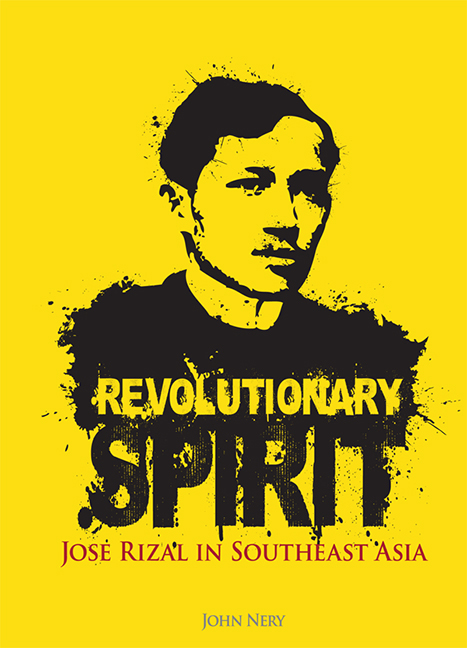Book contents
- Frontmatter
- Dedication
- Epigraph
- Contents
- Foreword
- Message
- Preface
- Acknowledgements
- INTRODUCTION The Uses of Error A Rizal Chronology
- 1 TURNING POINTS
- 2 “THE VERY SOUL OF THIS REBELLION”
- 3 DOCTOR RIZAL
- 4 “HALFBLOED”
- 5 “NO MARX OR LENIN”
- 6 UNDER THE SOUTHERN SUN
- 7 THE HOPE OF MILLIONS IN ASIA
- 8 “HIS NAME IS SWEET IN OUR MEMORY”
- 9 THE MYTH BUSTERS
- 10 “A GREAT HISTORICAL EXPERIMENT”
- Epilogue
- Appendices
- References
- Index
- Frontmatter
- Dedication
- Epigraph
- Contents
- Foreword
- Message
- Preface
- Acknowledgements
- INTRODUCTION The Uses of Error A Rizal Chronology
- 1 TURNING POINTS
- 2 “THE VERY SOUL OF THIS REBELLION”
- 3 DOCTOR RIZAL
- 4 “HALFBLOED”
- 5 “NO MARX OR LENIN”
- 6 UNDER THE SOUTHERN SUN
- 7 THE HOPE OF MILLIONS IN ASIA
- 8 “HIS NAME IS SWEET IN OUR MEMORY”
- 9 THE MYTH BUSTERS
- 10 “A GREAT HISTORICAL EXPERIMENT”
- Epilogue
- Appendices
- References
- Index
Summary
In 1921, an official holiday to mark the birthday of the Philippine revolutionary supremo Andres Bonifacio was celebrated in the Philippines for the first time; it came a generation after his execution. As labour leader Hermenegildo Cruz was to later recall, the day before the new holiday his school-aged children asked him, “Sino ba iyan si Bonifacio?/ — Who is that [man] Bonifacio?”
The pioneer labour organizer and nationalist writer was stunned. “Wari ako'y natubigan … — I felt like I had been doused.” After he recovered, he began to tell his children about Bonifacio and the Katipunan:
Sa maiikling pangungusap, ay aking ipinatanto sa mga anak ko ang buong kabuhayan ni Andres Bonifacio at ang sanhi't katwiran kung bakit siya'y ibinubunyi ng ating lahi't Pamahalaan. Akin ding ipinakilala sa kanila ang mga aral ng “Katipunan”; at isinaysay ang kapakinabangang natamo ng Bayang Pilipino sa paghihimagsik na pinamatnugutan ng kapisanang yaong itinatag at pinanguluhan ni Andres Bonifacio. [Cruz 1922: 9]
In simple words, I made my children understand the whole life story of Andres Bonifacio and the roots and reasons why he was being honoured by our race and government. I also introduced to them the principles of the Katipunan; and narrated the benefits gained by the Philippine nation through the revolution directed by that society founded and headed by Andres Bonifacio.
That teaching moment led Cruz to write Kartilyang Makabayan or Patriotic Primer, a revealing catechism (it follows a question-and-answer format) about Bonifacio and the Katipunan “na nagturo at nagakay sa Bayang Pilipino sa Paghihimagsik laban sa kapangyarihang dayo — which taught and guided the Philippine nation in the Revolution against foreign powers,” as the latter half of the volume's kilometric subtitle put it.
The Kartilyang Makabayan is revealing not only for what it suggests about Cruz's own biography (the dig at foreign powers seems to me calculated; Cruz was director of the Bureau of Labour in the American regime at the time he wrote the book), but also and mainly because it catches the evolution of the labour movement's understanding of Rizal a quarter-century after his execution.
- Type
- Chapter
- Information
- Revolutionary SpiritJose Rizal in Southeast Asia, pp. 122 - 142Publisher: ISEAS–Yusof Ishak InstitutePrint publication year: 2011



